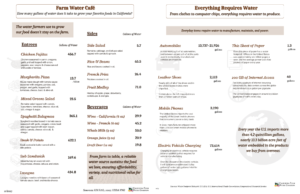Robustly Full to Empty Reservoirs
In two years, California’s State reservoirs have gone from beginning water 2020 “robustly” full, with historic releases of surplus potential supply and the memory of dangerous risks of flooding associated with the same storms that damaged Oroville Dam not far behind us, to devastating curtailments in August of 2021.
Largest surface water cut in California History
On August 3, the State Water Resources Control Board completely eliminated 2021’s surface water supplies for farms in much of the state.
The action affects about 5,700 water rights holders with roughly 12,500 water rights from north of Lake Shasta to Fresno, prohibiting them from diverting surface water for the purpose of farming.
This map shows the historically unprecedented surface water cuts that are affecting California agriculture, and America’s tables this year.
Fewer crops have been planted due to the drought and these additional cuts by the Water Board could affect the upcoming harvest of crops still in the ground. It has been two short years since the state’s reservoirs were largely full, yet supplies today are extremely low.
While criticisms of California’s water rights are common during droughts among those looking to reshuffle the deck, they shouldn’t ignore our state and federal leaders’ failure to meaningfully prepare for this drought. Both history and science tell us that California’s weather patterns inevitably shift from wet to dry, and back again. Scientific experts insist it will become more frequent as a result of our changing climate. Investing in smart, adaptive water management, growing our water supplies, and finding collaborative, science-based approaches are prudent steps as we prepare for California’s future.
Substantial new state and federal investments in our water supply infrastructure are needed to prevent future water shortages.


